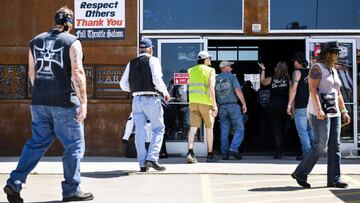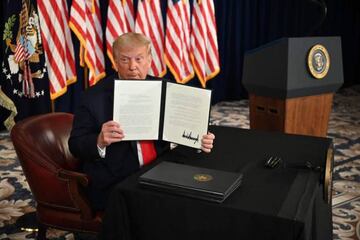Why has South Dakota rejected the $300-a-week unemployment benefit?
South Dakota has become the first state to take the unusual step of rejecting outright Donald Trump’s offer of $300 in extra unemployment benefits per qualifying individual.

On Saturday 8 August, Donald Trump signed an executive order to extend the unemployment benefit bonus aimed at supporting struggling individuals and families amid the coronavirus crisis.
His decision to take executive action came after Congress failed to agree on a new economic stimulus bill on the earmarked August 7 deadline – a bill that is expected to cover extended unemployment benefits that were approved under the CARES Act in March.
While the previous benefit under CARES Act, which expired at the end of July, was valued at $600, the extended benefit signed by Trump will see individuals receive up to $400. The federal government will pay $300 of that figure, while states are expected to cover the remaining $100. Though it remains to be seen how many states will be willing to pay the extra $100.
Ohio’s Republican Gov. Mike DeWine was the first governor to state last week that his administration would accept the federal government's $300 per week enhanced unemployment benefits but would not top it up with the additional $100. As such, Ohioans would receive a bonus unemployment payment valued at $300, not $400. Several other states are also expected to only offer the $300 from the federal government.

Why has South Dakota rejected the $300 benefit?
But South Dakota has become the first state to take the unusual step of rejecting outright Donald Trump’s offer of $300 per qualifying individual.
According to South Dakota’s Republican Gov. Kristi Noem, who has been a vocal ally of the White House, the additional funds are not needed because many workers in the state are returning to work as the South Dakotan economy continues to rebound following the fallout from the pandemic.
“My administration is very grateful for the additional flexibility that this effort would have provided, but South Dakota is in the fortunate position of not needing to accept it,” Gov. Noem said in a statement.
“South Dakota’s economy, having never been shut down, has recovered nearly 80% of our job losses. South Dakota is the only state in the nation that didn’t have extended benefits kick in because our insured unemployment rate has been the lowest in the nation.”
The state’s Department of Labor and Regulation reported last Thursday that unemployment claims had increased slightly to 911 claims, up from 775 the week prior, according to CBS Sioux Falls affiliate KELO.
33,000 South Dakotans benefitted from extra unemployment benefits
Some 33,000 South Dakotans benefitted from the extra unemployment funds that were approved in March under the CARES Act according to Forbes. Gov. Noem’s decision to turn down the extra help from the federal government through the extended benefit scheme will likely come as an unwelcome shock to many of those who are still unemployed in the state.
“If you’re an unemployed person in South Dakota, it’s not going to matter to you there aren’t a lot of unemployed people,” tweeted Michele Evermore of the National Employment Law Center (via Forbes).
Live coverage of the coronavirus crisis
You can follow live, US-focused coverage of the coronavirus crisis with our dedicated live blog.





